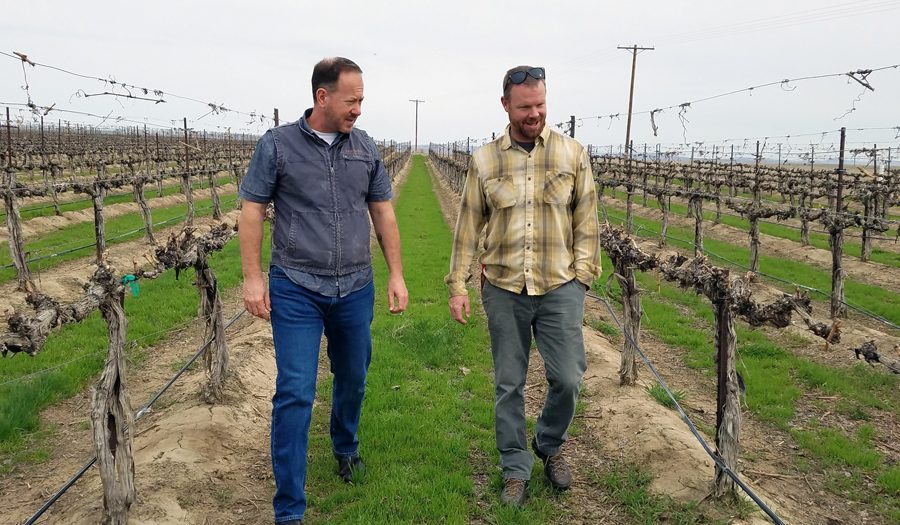
Winter’s snow adds strain to agriculture industry
Mid-Columbia farmers facing Yakima basin drought declaration on top of delay in planting, harvest
This year’s growing season may be
challenging for farmers with possible drought conditions and delayed plantings
after winter’s heavy, prolonged snow.
Wheat, wine grape, apple,
asparagus and potato industry officials reported weather-related delays because
of the record snowfall that blanketed the region for most of February and into
March.
But despite the significant snow,
water supply shortages are forecast in the Upper Yakima basin, which is 74
percent of normal. It’s prompted Gov. Jay Inslee to declare a drought emergency
in this watershed, along with the Methow and Okanogan basins.
The water supply for Yakima River
pro-ratable users such as Kennewick Irrigation District was at 77 percent in
early April, the district reported.
The state Department of
Agriculture is already advising growers to prepare and plan for limited water
supplies. Many high-value crops such as apples, berries, pears, cherries and
wine grapes could be at risk.
Potato farmers were about a month
behind in planting, and Chris Voigt, executive director for the Washington
Potato Commission, said that could lead to a fry-apocalypse this fall.
The shepody potato is an
early-season variety that’s fast-growing and typically ready to harvest the
first or second week of July. With the delayed planting season, potato farmers
are banking on a dry spring and hot temperatures to give potatoes time to catch
up.
“But a lot can happen between now
and the middle of July,” Voigt said. “We’re a little nervous about that.”
For the last month two, Voigt said
growers have been calling seed growers and fertilizer spreaders.
“Everybody is scrambling,” he
said.
Although the snow disappeared
quickly once mid-March hit, the wet soil made it difficult to use heavy
machinery in the fields.
“It compacts the soil and squishes
it down—turning it almost to cement. Dirt clods are created, and that will come
up with the harvester and get loaded with your truck. Your truck will have half
dirt and half potatoes,” Voigt said. “It’d be helpful to have a little bit of
wind right now. That’s great at drying out soil.”
Coyote Canyon Vineyards, which has
1,300 acres in the Horse Heaven Hills American Viticulture Area, had to limit
field equipment to avoid soil compaction, as it can affect water penetration.
In addition, the company is using neutron probes in 80 sites to analyze soil
data.
“I expected to see more runoff
from the snow melt, but it occurred at a nice rate, allowing most of the
moisture to be retained in the soil,” said Todd Chapman, vineyard manager for
Coyote Canyon. “We like to have a full soil moisture profile early in the
season to promote healthy canopy growth, gradually drying things out until
fruit set.”
Ray McKee, who owns Washington
Wine Consultants and works with vineyards such as Coyote Canyon, Chandler Reach
and Alexandria Nicole Cellars, said the snow had a positive impact in that it
provided a nice blanket so the vines could weather the freezing temperatures.
“It’s probably going to delay the
start of our season. For the last four years, we’ve seen bud break earlier and
earlier. Because there was quite a bit of snow, it will delay the ground from
warming up,” said McKee, adding that when temperatures reach 50 degrees,
dormant vines wake up.
Kimberly Garland-Campbell, a U.S.
Department of Agriculture researcher at Washington State University, has a
research specialty and interest in breeding wheat for winter survival. She said
the snow also might have been a blessing for winter wheat farmers, as it acted
as a protective blanket during the coldest temperatures.
State Department of Agriculture’s
Chris McGann said his agency is hearing that spring wheat planting will be
delayed as much as three weeks because of the weather.
Like the wheat, wine and potato
industries, the Washington Apple Commission said orchardists were about two to
three weeks behind in field work.
And the asparagus industry was
feeling the stress as well.
“There’s so much need for labor
around here during the spring,” said Greg Kinsey, who operates Kinsey Farms in
Sunnyside. “It’s pretty intense, but we’ll make it. We’re just going to have to
run tractors through the night if we have to.”
Normally Kinsey said his farm
would be ready to cut the first week of April.
“But that’s not going to happen,”
he said with a laugh.
Kinsey Farms has about 350 acres,
and while his crops may be delayed, one of his biggest concerns isn’t the
growth of produce, but rather finding labor.
For some companies, such as Coyote
Canyon, the unusually warm November and December months gave workers a head
start with pruning.
“A lot of growers were able to get
quite a bit of work done because of the mild winter,” McKee said.
Chapman added that Coyote Canyon
was two-thirds of the way done with pruning by the first week in February when
the snow came.
“Chandler Reach waited until now
to prune,” said McKee, referencing the 42-acre vineyard he consults for in
Benton City. “They’ve held off until a week ago, but at their size, they’ll
move through it in a couple of weeks.”
McKee went on to note that this
summer is forecast to be one of the warmest in years, and if predictions are
correct, they’ll be right back on track where they need to be in the vineyard.
“We hope for a nice, dry spring,
considering we have all the moisture we need already,” he said.
